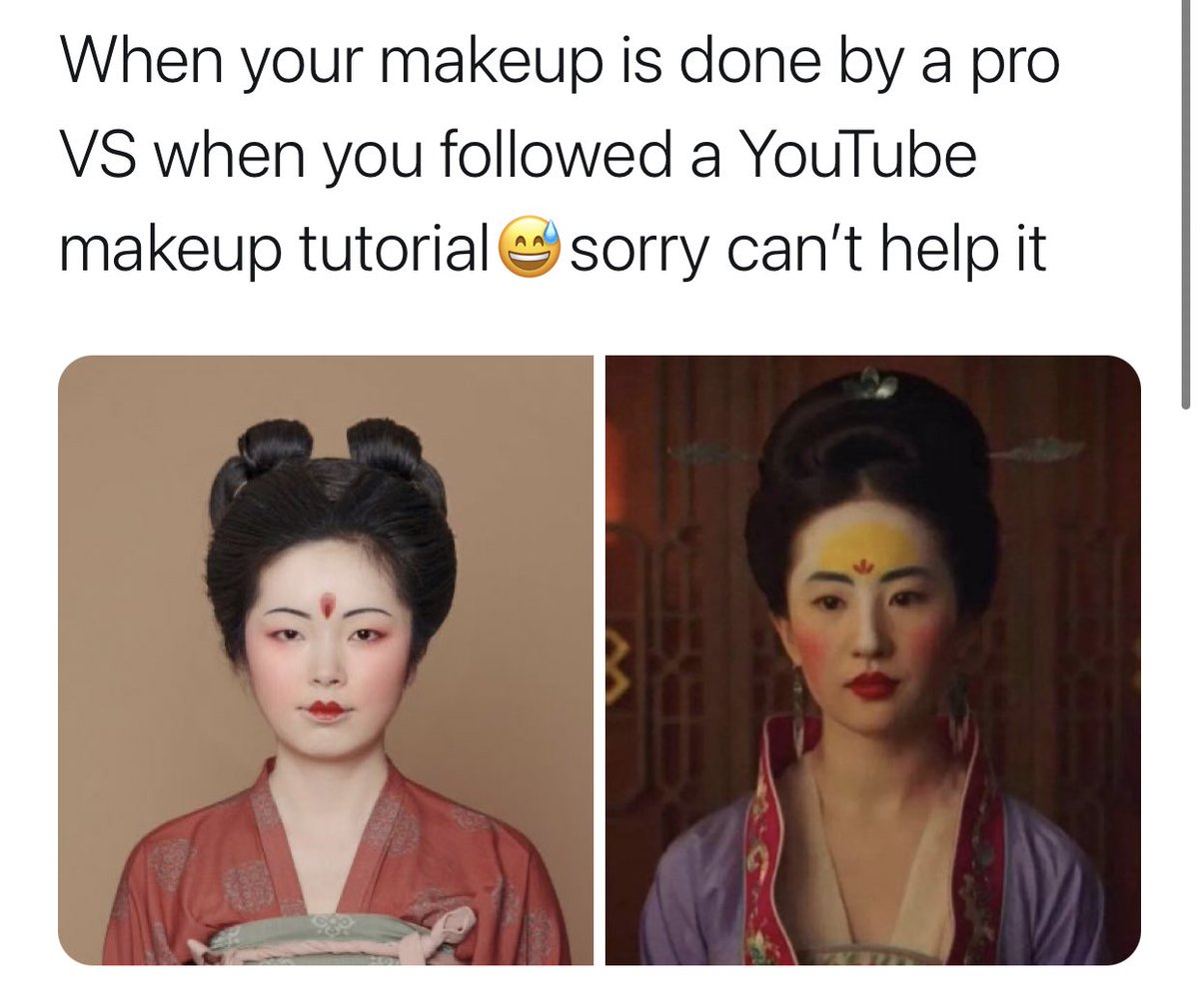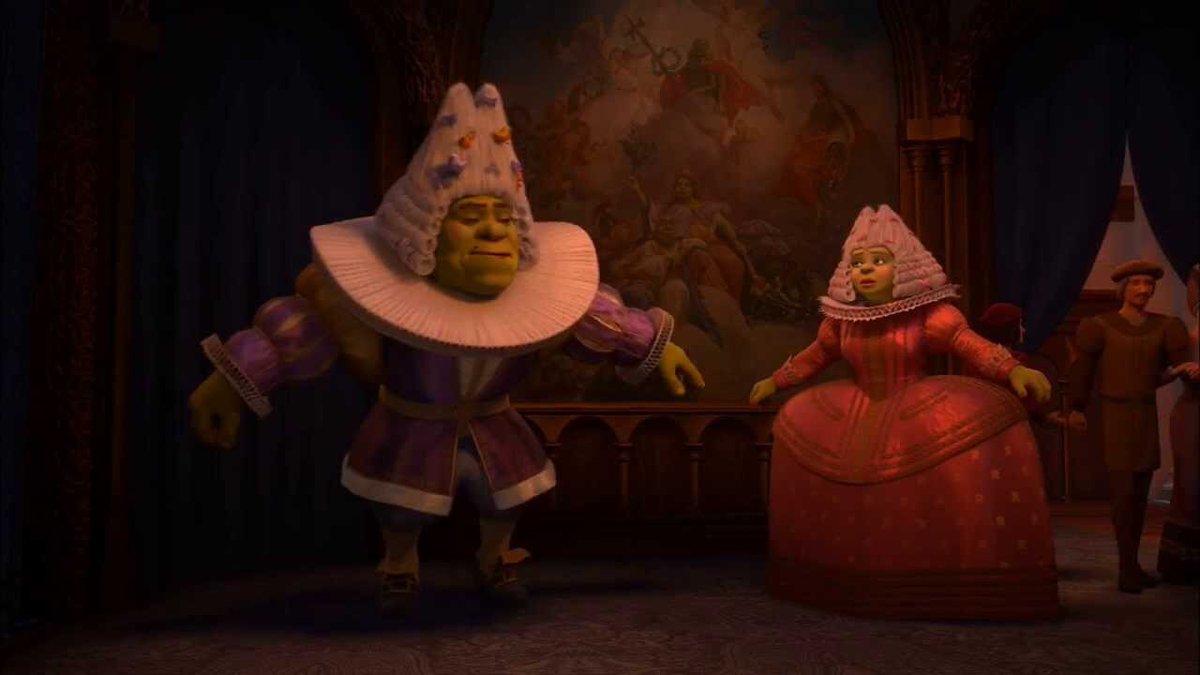Thinking of this and taking a step sideways, it's often how we (including me) end up experiencing art written by Asian ppl, expecting a recreation of their culture rather than ascribing agency to them as artists, making choices and reshaping reality within their fiction https://twitter.com/feliciadavin/status/1332506729590960130
I'm not here to defend Mulan (filmed in Xinjiang, where cultural genocide is still happening) but this tweet illustrates our denial of storytelling.
Her makeup looks bad because that's the story. However ham-fistedly executed, it's an obvious critique of traditional femininity.
Her makeup looks bad because that's the story. However ham-fistedly executed, it's an obvious critique of traditional femininity.
You can make a case for how the critique and caricature of traditional Chinese feminine aesthetics is xenophobic, for example. But it is weird for me to overlook completely the narrative.
For reference, here's a screenshot of Shrek doing the same emotional beat.
For reference, here's a screenshot of Shrek doing the same emotional beat.
Even as I'm about to launch into a defence of using aspects of culture as symbols, metaphors and shorthand, I feel compelled to immediately say it's also worth bearing in mind that these things are attached to real people with real experiences.
But even as I say, not all symbolism is good, it is frustrating to me that we are disinclined as culture to approach work by Asian artists or featuring Asian culture as capable of having this symbolic dimension. That they are created worlds.
The gut response tends toward "it's not like that, this is wrong" rather than "why did they make that change to history/tradition? How does this serve their theme and the story they are trying to tell?"
And I understand that things being different can feel uncanny, that it can take you out of the story.
But I feel like we need to be seeing each other as artists rather than transcribers. To see art as art rather than depositions.
But I feel like we need to be seeing each other as artists rather than transcribers. To see art as art rather than depositions.
Maybe we are so used to critiquing art written about but not by Asian people, where our otherness is simplistic and serving wholly as a symbol that we embrace this realist, literal approach to art.
But I can feel this pull when watching Over the Moon, where this urge to pinpoint where they've set this film and the pull apart the exact details of the cultural representation in a way that I'm very willing to just roll with the world as presented in Big Hero 6.
We do talk the frustrations we feel as poc writers to represent our culture. That our work gets read as travel guides; reviews complain abt not learning enough about our culture. All this is good.
But I think we can talk a little more about craft and intention.
But I think we can talk a little more about craft and intention.
Navigating what a symbol or a story means is hard. Especially when the mainstream culture is intent on re-contextualising those stories, taming them. Giving them meanings we didn't necessarily intend https://twitter.com/jeannette_ng/status/1221634938161827841
So I don't want to pretend it is easy? Or that there are simple answers. There isn't a single correct way to write about our culture or identities. The point is that as that there can be multiple meanings and not all of them can be controlled easily.
But the answer can't be returning to only the barometers of authenticity and accuracy as measures of art. That cannot be the sum of their worth.
This attitude that we are not artists, but neutral conduits to a pure culture that can be accessed and appropriated colours a lot of how we approach translation https://twitter.com/ninamingya/status/1331154963523833865
I cannot stress enough that for something to be a conscious artistic choice does not put it above reproach. It can absolutely still be reenforcing problematic stereotypes or be just plan art you don't connect with.
Not everything is a failure of "research"
Not everything is a failure of "research"
Talking about our art in those terms. Not as a guided tour or an anthropological text. Not as merely a mirror, good or bad representation.
But as decisions made, symbols and stories. That there is an artist with feelings behind it, & they are shaping this story. There is craft.
But as decisions made, symbols and stories. That there is an artist with feelings behind it, & they are shaping this story. There is craft.
Speaking of metaphors and symbolism and all, here's a thread of slides: https://twitter.com/demigodly_kachi/status/1331989239970615296
And I grew up with the guided tour attitude to Chinese culture as more or less the norm. I’ve absorbed all the background radiation of Chinese Nationalism and Han Supremacy. These paradigms are hard to shed and interrogate. It is easy to unknowningly perpetuate.
But it isn’t just that there are people who want to treat us as impartial, transparent conduits to a pure culture, there are people who are willing to perform that role. To be evangelists of Chinese greatness.
I remember an uncomfortable aftertaste when I came to the author notes of a historical novel set in Tang China recently and it began with the author outlining how she wrote to educate white people about all the strong, powerful women in Chinese history.
It articulated for me immediately that feeling I had felt all book: this book isn’t for me.
Anyway. I’m not the fucking lorax, I don’t speak for the trees. These are just some feelings.
Anyway. I’m not the fucking lorax, I don’t speak for the trees. These are just some feelings.

 Read on Twitter
Read on Twitter



